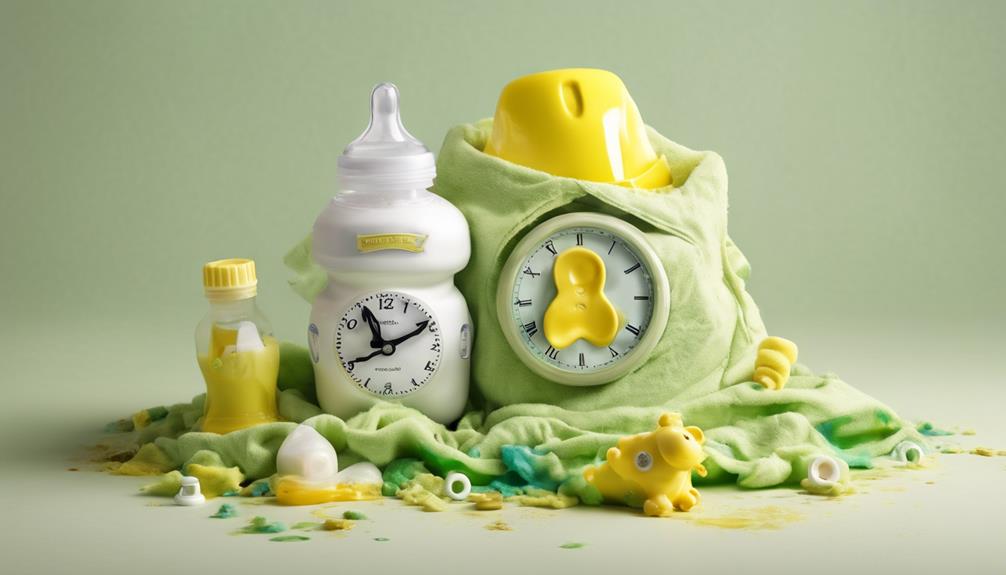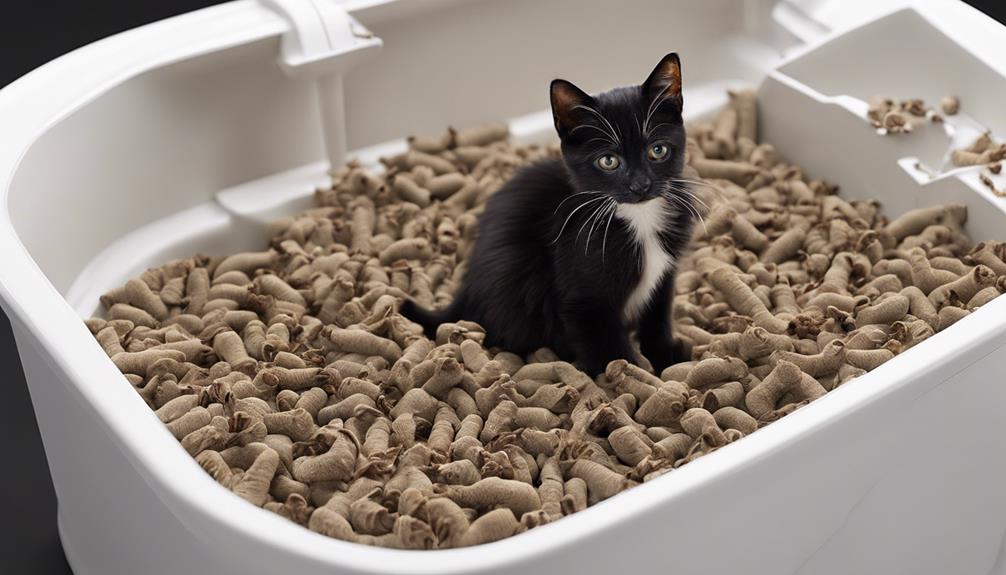As we step into the realm of newborn poop schedules, it's like exploring uncharted waters – intriguing yet filled with uncertainty.
The frequency of a newborn's bowel movements can be a topic of concern for many parents, leading to questions about what's considered normal.
Let's shed light on the mysterious world of newborn poop and explore the guidelines that can help us understand and monitor our little one's digestive health.
Key Takeaways
- Newborns typically poop 2-5 times a day, reflecting digestive health.
- Breastfed babies may have more frequent, smaller poops.
- Formula-fed babies tend to have fewer but larger bowel movements.
- Monitoring poop frequency is vital for assessing newborn well-being.
Normal Newborn Poop Frequency
Newborns typically excrete feces 2-5 times a day during the initial weeks of life. When it comes to baby poop, there are differences between breastfed and formula-fed infants. Breastfed babies often have more frequent bowel movements, sometimes after each feeding session, producing smaller amounts each time.
On the other hand, formula-fed babies might have fewer but larger bowel movements per day. Understanding these variations is important in gauging what's normal for your baby. It's advisable to consult a pediatrician if you have concerns about your newborn's poop frequency.
While the range of 2-5 times a day is considered normal, any significant deviations from this pattern should prompt a discussion with a healthcare provider. Monitoring your baby's poop frequency can provide valuable insights into their digestive health and overall well-being.
Factors Affecting Newborn Poop Frequency

Factors influencing the frequency of newborn poop include the method of feeding, digestive efficiency, and hydration levels. Breastfed babies tend to have more bowel movements, sometimes after each nursing session, resulting in multiple daily poops. This frequent poop frequency in breastfed infants is due to the easily digestible nature of breast milk. On the other hand, formula-fed babies typically have fewer but larger stools, usually ranging from 1 to 4 bowel movements a day. The feeding method directly impacts the newborn poop frequency, with breastfed babies often having more frequent bowel movements compared to formula-fed babies.
Additionally, the efficiency of digestion plays a role in how often a newborn poops. Some infants may digest food more efficiently, leading to fewer bowel movements, while others may have a quicker digestive process resulting in more frequent poops. Hydration levels also affect poop frequency, as adequate hydration supports proper digestion and bowel movements. Monitoring the frequency of newborn poops is essential for evaluating overall newborn health, ensuring they're receiving proper nutrition, and promptly addressing any potential concerns.
Signs of Healthy Newborn Poop
When examining the characteristics of healthy newborn poop, it's essential to note specific visual and olfactory cues that denote normal digestive function.
- Healthy newborn poop is typically soft, yellow, or greenish in color.
- The consistency of newborn poop may resemble mustard or have a seedy texture.
- Newborn poop should have a mild, slightly sweet smell.
- Frequent pooping in newborns, especially breastfed babies, indicates proper feeding and digestion.
Observing a breastfed baby's dirty diapers throughout the day can provide valuable insights into their bowel health. The first bowel movements of a newborn, called meconium, shift into the characteristic yellow stools of a breastfed baby. Recognizing these signs helps parents gauge their newborn's well-being and make sure they're receiving adequate nutrition.
When to Seek Medical Advice

Shifting from examining signs of healthy newborn poop, it becomes essential to recognize the warning signs that necessitate seeking medical advice regarding a newborn's bowel movements. If your newborn hasn't pooped in 4 days, it could indicate constipation, and consulting a healthcare provider is advised. Immediate medical attention is necessary if the baby's poop is black, white, or bloody, as these could indicate underlying issues. Keeping track of any changes in poop frequency, consistency, or color is vital. It's key to discuss any concerns with a pediatrician to guarantee the baby's well-being. Trusting parental instincts is key; seek medical help if the baby shows signs of dehydration alongside abnormal stool patterns. Regular communication with a pediatrician is essential for guidance on a newborn's poop patterns and any concerns that may arise. Below is a table summarizing the key points to contemplate when deciding to seek medical advice regarding your newborn's bowel movements:
| Warning Signs | Action Required |
|---|---|
| No poop for 4 days | Consult healthcare provider |
| Black, white, or bloody poop | Seek immediate medical attention |
| Changes in frequency, consistency, or color | Discuss with pediatrician |
Monitoring Newborn Poop Patterns
Monitoring newborns' stool output provides valuable insights into their digestive health and overall well-being. When observing newborn poop patterns, it's essential to take various factors for a thorough understanding:
- Frequency: Newborns typically poop 2-5 times a day in the first few weeks, indicating a healthy digestive system.
- Breastfed vs. Formula-fed Babies: Breastfed babies may have more frequent, smaller poops, while formula-fed babies may have less frequent but larger bowel movements.
- Diaper Changes: Regularly changing diapers is important for monitoring poop frequency and consistency.
- Pediatrician Consultation: Consulting a pediatrician is recommended if there are concerns about the newborn's poop patterns, especially if there are drastic changes or signs of distress.
Understanding the nuances of newborn poop patterns can provide valuable insights into their well-being and help detect any potential issues early on. By staying vigilant and seeking professional advice when needed, parents can guarantee their newborn's health and comfort.
Frequently Asked Questions
How Many Poop per Day Is Normal for Newborn?
We aim to provide assurance by stating that newborns typically poop once a day, but breastfed babies may have multiple bowel movements daily, while formula-fed infants might go less often. Consistent output usually signals good health.
How Often Should a Newborn Poop Chart?
We've got this! Newborns typically poop once a day to multiple times, depending on breastfed or formula-fed. Changes are normal as their system develops. If poop habits drastically change, it's wise to check in with a pediatrician.
How Do I Know if My Newborn Is Pooping Too Much?
We monitor newborn poop for health concerns. Excess poop could signal issues. Seek medical advice for changes in frequency or consistency. Trust your instincts and consult with a pediatrician promptly to guarantee your baby's well-being.
How Many Times a Day Should a Newborn Poop on Formula?
I comprehend the concern. Formula-fed newborns typically poop 3-4 times a day. Remember, every baby is unique. Trust your instincts and consult your pediatrician for guidance. I'm here to support you.
Conclusion
To sum up, monitoring a newborn's poop frequency is crucial for their overall health. Did you know that a breastfed baby can poop up to 10 times a day, while a formula-fed baby may only poop once a day? Understanding these differences can help parents track their baby's development and guarantee they're getting the proper nutrition.
Remember, always consult with a pediatrician to make sure your baby's poop patterns are healthy and normal.










